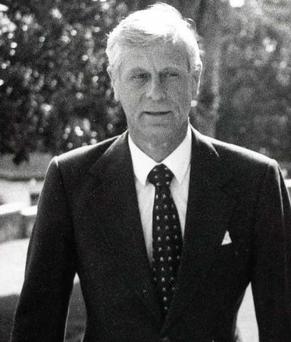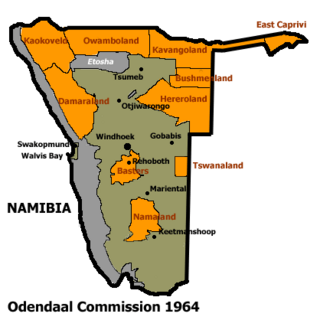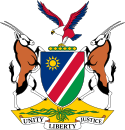
Politics of Namibia takes place in a framework of a semi-presidential representative democratic republic, whereby the President of Namibia is both head of state and head of government, and of a pluriform multi-party system. Executive power is exercised by both the president and the government. Legislative power is vested in the two chambers of Parliament. The judiciary is independent of the executive and the legislature.

South West Africa, renamed to Namibia from 12 June 1968, was a South African Province under South African administration from 1915 to 1990, after which it became modern-day Namibia. It bordered Angola, Botswana, South Africa, and Zambia. During its administration, South Africa applied its own apartheid system in the territory of South West Africa.

The Union of South Africa was the historical predecessor to the present-day Republic of South Africa. It came into existence on 31 May 1910 with the unification of the Cape, Natal, Transvaal, and Orange River colonies. It included the territories that were formerly part of the South African Republic and the Orange Free State.
The history of Namibia has passed through several distinct stages from being colonised in the late nineteenth century to Namibia's independence on 21 March 1990.

Bophuthatswana, officially the Republic of Bophuthatswana, and colloquially referred to as the Bop, was a Bantustan that was declared (nominally) independent by the apartheid regime of South Africa in 1977. However, like the other Bantustans of Ciskei, Transkei and Venda, its independence was not recognized by any country other than South Africa.

A Bantustan was a territory that the National Party administration of South Africa set aside for black inhabitants of South Africa and South West Africa, as a part of its policy of apartheid.

Gaob Dr. Justus ǀUruhe ǁGaroëb is the Gaob (King) of the ǂNūkhoe ǁAes as of 1977 [year of customary designation] and is the longest serving supreme traditional leader in recorded history. Historical accounts have it that most gaogu (kings) reigned for 25 years (average), whilst the nation celebrated the Sapphire Anniversary of the ǁGaroëb dynasty. He (just like most if not all pre-independence traditional leaders was active in national politics and was at the forefront of the Namibian struggle for Independence. Gaob Dr. ǁGaroëb was a staunch opponent of South African rule and led the oppositional Namibia National Front in the late 1970s and founded the United Democratic Front in 1989.

The Popular Democratic Movement (PDM) is an amalgamation of political parties in Namibia, registered as one singular party for representation purposes. In coalition with the United Democratic Front, it formed the official opposition in Parliament until the parliamentary elections in 2009. The party currently holds 16 seats in the Namibian National Assembly and one seat in the Namibian National Council and is the official opposition. McHenry Venaani is president of the PDM.
Dirk Frederik Mudge was a Namibian politician. He served in several high-ranking positions in the South African administration of South West Africa, was the chairman of the 1975–1977 Turnhalle Constitutional Conference, and co-founded the Republican Party (RP) of Namibia as well as the Democratic Turnhalle Alliance (DTA), now known as the Popular Democratic Movement (PDM).

Hereroland was a bantustan and later a non-geographic ethnic-based second-tier authority, the Representative Authority of the Hereros, in South West Africa, intended by the apartheid-era government to be a self-governing homeland for the Herero people.

The Namibian Broadcasting Corporation (NBC) is the public broadcaster of Namibia. It was established in 1979, under the name South West African Broadcasting Corporation (SWABC).

Louis Alexander Pienaar was a South African lawyer and diplomat. He was the last white Administrator of South-West Africa, from 1985 through Namibian independence in 1990. Pienaar later served as a minister in F W de Klerk's government until 1993. He married Isabel Maud van Niekerk on 11 December 1954.

The Transitional Government of National Unity (TGNU), was an interim government for South West Africa (Namibia) between June 1985 to February 1989.

The Turnhalle Constitutional Conference was a conference held in Windhoek between 1975 and 1977, tasked with the development of a constitution for a self-governed South West Africa (Namibia) under South African control. Sponsored by the South African government, the Turnhalle Conference laid the framework for the government of South West Africa from 1977 to independence in 1989.
Johannes Gerard Adolph Diergaardt, more commonly known as Hans Diergaardt was a Namibian politician active for nearly a decade after Namibia gained independence. Prior to that, he was elected as the fifth Kaptein of the then-autonomous Baster community at Rehoboth, succeeding Dr. Ben Africa in 1979 after winning a court challenge to the disputed election of 1976.

Parliamentary elections were held in South West Africa between 4 and 8 December 1978. These were the first elections conducted under universal adult suffrage, all previous elections had been Whites-only. The 1978 elections were won by the Democratic Turnhalle Alliance, which claimed 41 of the 50 seats. The elections were conducted without United Nations (UN) supervision, and in defiance of the 1972 United Nations General Assembly's recognition of the South West African People's Organisation (SWAPO) as the "sole representative of Namibia's people". The UN henceforth declared the elections null and void. The resulting government, dependent on South African approval for all its legislation, was in power until its dissolution in 1983.

The Turnhalle is a building in Windhoek, the capital of Namibia. Built during the era of Imperial Germany's colonisation of South West Africa, it has been through a variety of uses, most prominently as the venue for the 1975–1977 Turnhalle Constitutional Conference, an attempt to quell armed resistance waged by the People's Liberation Army of Namibia against South African occupation. The Turnhalle housed the Tribunal court of the Southern African Development Community (SADC) until disbandment in 2012.

Constance Letang Kgosiemang was the paramount chief of the Tswana people in Namibia, a parliamentarian, and the leader of the Seoposengwe Party until its merger into the Democratic Turnhalle Alliance (DTA).
Mburumba Kerina was a Namibian politician and academic. He was a co-founder of SWAPO, NUDO, and FCN, and the founder of a host of smaller political parties. For independent Namibia, he was a member of Namibia's Constituent Assembly, as well as the National Assembly and the National Council. Kerina coined the name "Namib" for the independent state "Namibia" on the territory of South West Africa.

Cape independence, also known by the portmanteau CapeXit, is a political movement that seeks the independence of the Western Cape province from South Africa.













